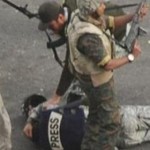Open Season on Reporters
 In dicey situations, journalists are often the easiest targets.
In dicey situations, journalists are often the easiest targets.
If more proof is needed that the days of the Mubarak regime are numbered in Egypt, one need look no further than what’s happening to journalists in Cairo.
In dicey situations, journalists are often the easiest targets.
Sort of silence the messenger and you defuse the crisis.
It rarely works, but it’s almost an automatic response by those who feel threatened.
The false cheerfulness towards journalists by protesters in the early days of the Cairo demonstrations (was it only a few days ago?), has turned progressively uglier.
And while pro-government mobs seem the most belligerent, one must remember that they also have the most establishment power. But vigilantism is also underway. As police and the army get nastier, so do the “Murbarak must go” demonstrators. And journalists are caught in the middle.
The trouble when roughing up journalists becomes a main story, is that the real story of Egypt’s future gets second billing.
And many of those reporting and broadcasting from Cairo have never been targeted by mobs before – be it anti-government or pro-government mobs, neither of whom has much use for the foreign press.
Of course democratic governments publicly deplore violence towards the media (one wonders if they really care, and if they perhaps secretly relish the idea that pesky, opinionated journalists are being roughed up?).
Not all of the media attempting to cover Cairo are those who’ve worked in Iraq and Afghanistan and even the Balkans, where journalists - like soldiers - quickly learn to identify danger and behave discreetly.
Which is not to justify the smashing of cameras, destroying camera imagery, arresting reporters under the euphemism of “protective custody,” and trying to ban them from Tahrir Square (Liberation Square) which is Ground Zero for the demonstrators and police.
In such situations relatively new organizations like Reporters without Borders, and Committees to Protect Journalists and the like, are essentially useless.
Later, when the crisis is over, such organizations hold fund-raising dinners complete with speeches about freedom of the press, and awards given to select journalists who were beaten up and/or behaved bravely.
Fine for setting a tone – but not much use to Swedish journalist Bert Sundstrom who apparently was separated from his TV crew and knifed while caught in a Cairo mob.
As violence increases in Cairo, journalists who don’t already know it will learn that it’s every man for himself. There is no absolute protection, no guarantee that they won’t become victims.
That reality is part of the “high,” in being a journalist. Just as combat soldiers experience a euphoric high when in a fire-fight and surviving, so journalists get a “kick” from covering a potentially dangerous situation and emerging unscathed.
In Cairo, if the pro-regime forces were winning, and felt they had the people behind them, they’d want foreign journalists to reflect their progress and would try to accommodate them – within limits.
The diffused protesters tend not to discriminate and lash out at the symbols of Western arrogance which, too often, are the foreign press. Every faction has an ox to gore.
As well as tested warhorses in the media covering Cairo, a new generation of journalists is there. It’s the same with every unexpected international crisis: fresh journalists arrive to get their battle scars and learn their trade -- or realize that this isn’t the life for them, and vanish back into the world of domestic journalism.
Either way, change seems now unstoppable in Egypt.
Tweet